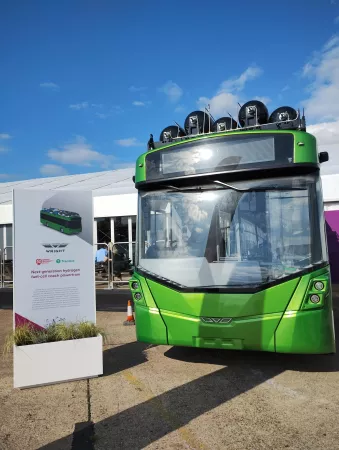
Symbio (Saint-Fons, France), Wrightbus (Ballymena, Northern Ireland, UK), the Advanced Propulsion Centre UK (APC) (Coventry, UK), Sept. 4, 2024 — Symbio and Wrightbus revealed a 300 kW Hydrogen Fuel Cell demonstrator coach at Cenex Expo 2024, the leading forum for Net-Zero Connected Automated Mobility (September 4 and 5, Millbrook, UK). The project aims to pave the way for hydrogen public transportation beyond city buses and was match-funded by the UK’s Department for Business and Trade, through the Advanced Propulsion Centre UK (APC).
A partnership to develop a 300 kW, zero-emission demonstrator fuel cell coach and future 75 kW city bus applications.
Symbio and Wrightbus signed a partnership to develop and demonstrate a zero-emission, hydrogen fuel cell coach designed for on-road public transportation in the UK. The joint project started in January 2024 with the delivery by Symbio to Wrightbus of four 75 kW StackPack™ fuel cell systems, forming a 300-kW power unit that Wrightbus integrated and tested into one of its single-deckers. The tests enabled the innovation teams on both sides to adjust and define the optimal settings for the vehicle’s powertrain. Having successfully completed this objective, the demonstrator is displayed for the first time at the Cenex Expo, starting Sept. 4, and will be operational and hit the road shortly.
This successful project sets the basis for future development of hydrogen-powered city buses equipped with Symbio 75 kW StackPack™ fuel cell systems, specifically designed for bus applications.
Other project partners include Translink, which will operate the coach, and Queens University Belfast, for both city bus and coach hydrogen-powered mobility.
Performant, compact, and flexible hydrogen fuel cell systems.
Symbio provides Wrightbus with StackPack™ 75 systems, compact fuel-cell solutions perfectly suited for bus and coach applications thanks to their performance, high-efficiency, and low-heat rejection, perfectly tailored for buses and coaches. Their advanced technology and versatile control strategy deliver optimised performance and durability for each application.
• Compactness: StackPack™ 75 is specifically designed for bus applications and offers 40% more power density while being 20% lighter than current market fuel-cell references.
• Power and efficiency: Symbio’s fuel-cell systems are among the most hydrogen-efficient, with a total system efficiency of 53%.
• Flexibility and availability: enabling vehicles to be run for two consecutive days without refuelling, with recharging times reduced to just a few minutes.
• Cooling: Symbio’s systems’ requirements are 30% lower than average thanks to an exit temperature of 85°C.
Multiple Symbio StackPack™ 75 can be combined on the same bus or coach, to create a more powerful system (up to 300 kW), increasing power range and reaching highest customer expectations in terms of efficiency and performance. Symbio fuel cells are designed and manufactured at SymphonHy, Symbio’s first Gigafactory and Europe's largest integrated hydrogen fuel cell production facility. The plant is a world-class manufacturing and sustainability reference for Symbio’s industrial expansion supporting its customers’ development plans. The Group is also present in the USA since 2021 through its Californian pilot-plant, as well as in Switzerland and Germany.
Hydrogen, an efficient and competitive zero-emission solution to decarbonise mobility.
Hydrogen is perfectly suited to decarbonise public transportation mobility, bringing distinctive advantages including long range, higher payload, fast refuelling, and a reduced total cost of ownership that is expected to reach TCO parity with battery-electric buses and coaches by 2030.
While governments are strengthening their efforts to decarbonise global economy, the Symbio-Wrightbus, APC-supported coach demonstrator fits into a context of growing demand for electric vehicles, either battery-equipped (BEV), fuel cell-equipped (FCEV) or hybrid (FHEV). From minimal to no movement up until 2025, APC expects projected fuel cell heavy-goods vehicles (FCHGV) and fuel cell bus (FCB) production by powertrain shares to reach 25% by 2035, due to the expected maturity of Proton Exchange Membrane (PEM) fuel cells by then (source: APC, “UK HDV supply chain opportunities to 2035 Insight report”, July 2024).
